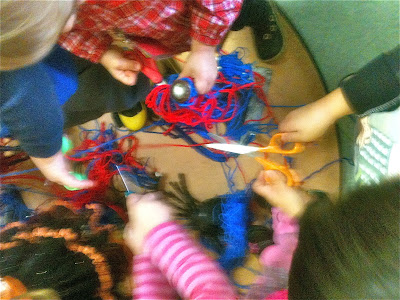Last night was our annual Halloween party; the big, loud sweaty one with more than 100 kids and at least as many adults. It's an all-school project the kids have been working on since the beginning of the month, all learning the same songs, creating decorations, and practicing making the babies laugh and the grown-ups scared with alternative "peek-a-boo" and just plain "Boo!" A team of adults arrived early to set up tables and hang decorations, while the rest were at home putting the finishing touches on their potluck dishes, picking up pizzas, delivering bales of straw, and (this year for the first time) preparing a silent auction featuring donations from our community both immediate and extended. Throughout the event, we worked together to take care of children, manage games, and empty the garbage. At the end of the evening the place looked like a frat house on Saturday morning, but within 30 minutes everything is set back to rights as if we were never there.

There is no written plan for this party, no boss, and no external carrot or stick motivator other than to come together for a good time. It's a project, a tradition by now, that happens in increments, with announcements at meetings, coordination through emails, sign-up lists, a community undertaking involving people who've known one another for a long time and others who will only meet at the party. Our team of early arrivers, for instance, the social coordinators from our three schools, began the evening by introducing themselves to one another. Each year the party has gotten bigger, more festive, and more elaborate, an organic project that continues to grow in the soil of institutional memory.
This is what communities do: collaborative projects, people stepping up as best they can, when they can, with what they can, to make something bigger happen. It's what we do in preschool as well, every day and over the course of many days.
Sometimes projects are part of traditions, like our Halloween party.
Sometimes they emerge from the passion of a single child, a kid with a question, like the guy who for several weeks running spent much of his time using our cast iron water pump and a length of gutter to flow water into our two little red wagons, which he wrangled up there each day, positioning them side by side, fussing, arranging, studying, adding bits and pieces, bending his head down for closer examination, often all on his own, but just as often with friends drawn in by his intense curiosity.
He could have complained, insisting that it was his, but as each child approached he made room for them, for their own curiosity, and when they moved on he simply carried on, not complaining that now he had a heavier load to bear.
Sometimes our projects appear unexpectedly as happened last week in our Pre-3 class.
We had flipped our big round table and had for several days been using the legs as anchors for spinning a yarn "spider web," which had by Friday become a massive rainbow tangle in which our entire collection of plastic spiders were enmeshed.
Our scissor caddy holds 15 pairs of scissors, all of which were immediately put to use as these 2-year-olds fell on the project, making it their own, working together, their bodies pressed into a tiny space, their hands wielding tools designed for cutting, tools most of them are still just learning to use, and for a good 15 minutes they stayed at it, making way, asserting themselves, doing a job that needed to be done simply because it needed to be done.
Sometimes our projects develop over several days, from the collective hive mind of the children.
For the past couple weeks, our oldest boys have been "experimenting" (their word) with the larger loose parts in the outdoor classroom, wrestling wooden planks, tires, rocks, ladders, and pipes into various configurations, usually on the theme of balance or leverage, sometimes involving our monkey bars or the swing set or water or mud, usually in small groups of two or three, often conducting several individual experiments at the same time.
Since many of these projects envision launching things through the air or dropping heavy things from heights or using our own bodies as part of the experiment, we've spent a lot of time on risk assessment, warning others to keep their distance if they don't want to get hurt or wet or muddy.
A common element in all of these projects, including the Halloween party, is that my role as teacher has been to do my best to simply stay out of the way and marvel at how people work together to achieve their ends, whatever their ends, without anyone telling anyone what to do.
It seems like every day I hear someone bemoan the loss of community in our world, how we've left behind the culture and values of "Mayberry." Some blame parenting or the break down of the family, others the media or technology, others find fault in the inexorable movement of population into our cities; many find the fault in "others," be they darker-skinned or from other places or poorer or wealthier.
I don't think community has gone anywhere. It resides within each of us, within the projects we undertake together, not at the coercive behest of an employer or leader, but on our own, shoulder-to-shoulder, when we see fit, as we see fit, out of necessity or not, without punishment or reward other than those that emerge naturally from our collaboration. But most importantly, without anyone telling us what to do. That's the only place from which community has ever grown.
I put a lot of time and effort into this blog. If you'd like to support me please consider a small contribution to the cause. Thank you!